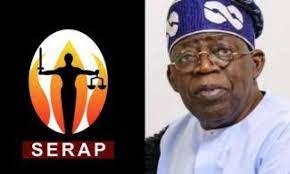Socio-Economic Rights and Accountability Project (SERAP) has taken legal action against President Bola Ahmed Tinubu regarding the failure to disclose spending details of approximately N400 billion, which has been saved as a result of removing the subsidy on Premium Motor Spirit (PMS), commonly known as petrol.
This legal action comes in response to reports indicating that the Federal Government has accumulated N400 billion in savings within the four weeks since implementing the removal of the petrol subsidy policy.
The lawsuit, identified as suit number FHC/L/CS/1514/2023, was filed last week at the Federal High Court in Lagos. SERAP is seeking an “order of mandamus” to direct and compel President Tinubu to publish the specific details of how the N400 billion has been spent since the removal of the petrol subsidy on May 29, 2023.
Additionally, SERAP is requesting a further “order of mandamus” to direct and compel President Tinubu to furnish details regarding the plans for utilizing the savings from the petrol subsidy removal, including information on the specific projects on which these funds will be allocated.
The main objective behind this legal action is to promote transparency, accountability, and public oversight regarding the government’s financial decisions related to the removal of the petrol subsidy and the allocation of the resulting savings.
SERAP is also seeking an order of mandamus to compel President Tinubu to provide transparent and detailed information regarding the mechanisms that have been implemented to ensure that the savings from the removal of subsidy on petrol are not diverted into private pockets.
In the suit, SERAP argues that Nigerians have the legitimate right to know how these savings are being utilized. By disclosing the spending details of the savings, it would significantly reduce the risks of corruption in the allocation and expenditure of these funds. Transparency in the usage of public funds is crucial for fostering accountability and trust in the government’s actions.
SERAP is arguing that “The Tinubu government has a legal obligation to ensure that the savings from the removal of subsidy on petrol are dedicated exclusively for the benefit of the 137 million underprivileged Nigerians who are bearing the brunt of the removal.”
SERAP is also arguing that, “Transparency in the spending of the savings from subsidy removal is crucial to safeguard the fundamental interests of the citizens and the public interest.”
According to SERAP, “There is a risk that the savings from subsidy removal may be embezzled, misappropriated, or diverted into private pockets.”
The suit filed on behalf of SERAP by its lawyers, Kolawole Oluwadare, Ms. Adelanke Aremo, and Ms. Valentina Adegoke, states: “Ensuring transparency would foster public trust and confidence that these savings would be utilized for the benefit of Nigerians.”
“The Nigerian Constitution, 1999 [as amended], Freedom of Information Act, and the country’s anti-corruption and human rights obligations emphasize the principle that citizens should have access to information regarding their government’s activities.”
The prevention of corruption in the spending of savings resulting from the removal of subsidy on petrol and addressing the challenges arising from it are vital public interests.
The government, led by Tinubu, holds a legal obligation to safeguard individuals against threats posed to human rights due to subsidy removal and effectively handle its aftermath.
To avoid undermining the rights of Nigerians and exacerbating poverty, it is imperative that the government is compelled and directed to publish the details of spending the savings from subsidy removal.
The National Social Safety Net Programme (NASSP) and its expenditure have mostly been shrouded in secrecy, necessitating the transparent publication of the N400bn savings and other subsequent savings from subsidy removal. This step will hold public officials accountable for their duties.
By ensuring transparency and accountability in the spending of the N400bn saved from subsidy removal, and subsequent savings, the government can utilize these funds to aid impoverished Nigerians in overcoming the adverse effects of such removal.
Moreover, this action will prevent inflicting double jeopardy on socially and economically vulnerable Nigerians, an outcome that would be morally repugnant.
The lack of transparency and accountability in the spending of subsidy removal savings directly threatens fundamental human rights, which the government is obligated to protect.
The Tinubu government holds legal responsibilities to address the effects of subsidy removal on the human rights of 137 million poor Nigerians and mitigate the dire consequences disproportionately impacting them.
The removal of subsidy on petrol continues to negatively affect poor Nigerians, violating their right to an adequate standard of living.
Years of corruption allegations and mismanagement in public fund spending, coupled with impunity for perpetrators, have eroded public trust in governments at all levels.
The Freedom of Information Act, Section 39 of the Nigerian Constitution, article 9 of the African Charter on Human and Peoples’ Rights, and article 19 of the International Covenant on Civil and Political Rights guarantee everyone the right to information, including details on the spending of the N400bn and other savings from subsidy removal.
According to the combined reading of the Nigerian Constitution, the Freedom of Information Act, and the African Charter on Human and Peoples’ Rights, the government is obligated to widely publish the details of how the N400bn and other savings from subsidy removal are spent.
Section 13 of the Nigerian Constitution explicitly demands the government to conform to, observe, and apply the provisions of Chapter 2 of the constitution, while Section 15(5) imposes the responsibility to ‘abolish all corrupt practices and abuse of power’ in the country.
Under Section 16(1) of the Constitution, the government is responsible for securing the maximum welfare, freedom, and happiness of every citizen on the basis of social justice and equality of status and opportunity.
Section 16(2) further emphasizes that ‘the material resources of the nation are harnessed and distributed as best as possible to serve the common good.’
Similarly, articles 5 and 9 of the UN Convention against Corruption also impose legal obligations on the government to ensure proper management of public affairs and funds and promote sound and transparent administration of public affairs.
The forthcoming hearing date for the suit is yet to be fixed.




